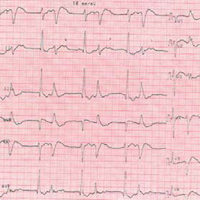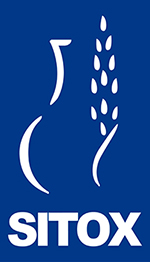A perfect refractory electrical storm by acute toxicity of accidental aconitine intake

Accepted: 30 April 2021
All claims expressed in this article are solely those of the authors and do not necessarily represent those of their affiliated organizations, or those of the publisher, the editors and the reviewers. Any product that may be evaluated in this article or claim that may be made by its manufacturer is not guaranteed or endorsed by the publisher.
A 51-years-old male presented with drooling, hematemesis and diarrhea in emergency department after accidental ingestion of homemade aconitine tincture. Examination revealed shock and initial ECG showed atrial fibrillation. The patient suddenly developed a pulseless wide QRS complex tachycardia requiring resuscitation maneuvers. The rhythm varied from monomorphic ventricular tachycardia to torsade de point to ventricular fibrillation. Repeated direct-current cardioversions were unsuccessful. After intravenous electrolyte correction and anti-arrhythmic drugs administration, a last direct-current shock was finally successful. Bradycardia and ventricular excitability persisted over 12 hours with gradual normalization. Patient was discharged in normal sinus rhythm without any medication and on follow-up he was totally asymptomatic.
With the increasing popularity of traditional medicine, clinicians should be alerted to the risk of herbal substances with low margins of safety like Aconitum in order to allow correct diagnosis and treatment. The general public should be educated that herbal medicine is not always safe.
Benson BE, Hoppu K, Troutman WG, et al. Position paper update: gastric lavage for gastrointestinal decontamination. Clin Toxicol (Phila) 2013;51:140-6. DOI: https://doi.org/10.3109/15563650.2013.770154
Xiao P, Wang F, Gao F, et al. A pharmacophylogenteic study of Aconitum L (Ranunculaceae) from China. Acta Phytotaxonomica Sinica 2006;44:1–46. DOI: https://doi.org/10.1360/aps050046
Singhuber J, Zhu M, Prinz S, et al. Aconitum in Traditional Chinese Medicine—A valuable drug or anunpredictable risk? J Ethnopharmacology 2009;126:18–30.
Singhuber J, Zhu M, Prinz S, Kopp B. Aconitum in Traditional Chinese Medicine—A valuable drug or an unpredictable risk? J Ethnopharmacol 2009;126:18-30. DOI: https://doi.org/10.1016/j.jep.2009.07.031
Liu S, Li F, Li Y, et al. A review of traditional and current methods used to potentially reduce toxicity of Aconitum roots in Traditional Chinese Medicine. J Ethnopharmacol 2017;207:237-50. DOI: https://doi.org/10.1016/j.jep.2017.06.038
Fujita Y, Terui K, Fujita M, et al. Five cases of aconite poisoning: toxicokinetics of aconitines. J Anal Toxicol 2007;31:132–7.
Bicker W, Monticelli F, Bauer A, et al. Quantification of aconitine in post-mortem specimens by validated liquid chromatography-tandem mass spectrometry method: three case reports on fatal ‘monkshood’ poisoning. Drug Test Anal 2013;5:753–62. DOI: https://doi.org/10.1002/dta.1501
Van Landeghem AA, De Letter EA, Lambert WE, et al. Aconitine involvement in an unusual homicide case. Int J Legal Med 2007;121:214–9. DOI: https://doi.org/10.1007/s00414-006-0119-5
Tai TY, But PP, Young K, Lau CP. Cardiotoxicity after accidental herb‐induced aconite poisoning. Lancet 1992;340:1254-6.
Veit F, Gürler M, Nebel A, et al. Intentional ingestion of aconite: Two cases of suicide. Forensic Sci Int Rep 2020;2:100158. DOI: https://doi.org/10.1016/j.fsir.2020.100158
Fujita Y, Terui K, Fujita M, et al. Five cases of aconite poisoning: toxicokinetics of aconitines. J Anal Toxicol 2007;31:132-7. DOI: https://doi.org/10.1093/jat/31.3.132
Tai YT, But PPH, Young K, Lau CP. Cardiotoxicity after accidental herb-induced aconite poisoning. Lancet 1992;340:1254–56. DOI: https://doi.org/10.1016/0140-6736(92)92951-B
Yamanaka H, Doi A, Ishibashi H, et al. Aconitine facilitates spontaneous transmitter release at rat ventromedial hypothalamic neurons. Br J Pharmacol 2002;135:816–22. DOI: https://doi.org/10.1038/sj.bjp.0704517
Chan TY. Aconite poisoning. Clin Toxicol (Phila) 2009;47:279-85. DOI: https://doi.org/10.1080/15563650902904407
Friese J, Gleitz J, Gutser UT, et al. Aconitum sp. alkaloids: the modulation of voltage-dependent Na+ channels, toxicity and antinociceptive properties. Eur J Pharmacol 1997;337:165–74. DOI: https://doi.org/10.1016/S0014-2999(97)01268-5
Wang YJ, Chen BS, Lin MW, et al. Time-dependent block of ultrarapid-delayed rectifier K+ currents by aconitine, a potent cardiotoxin, in heart-derived H9c2 myoblasts and in neonatal rat ventricular myocytes. Toxicol Sci 2008;106:454–63. DOI: https://doi.org/10.1093/toxsci/kfn189
Coulson JM, Caparrotta TM, Thompson JP. The management of ventricular dysrhythmia in aconite poisoning. Clin Toxicol (Phila) 2017;55:313-21. DOI: https://doi.org/10.1080/15563650.2017.1291944
Li S, Chen D. Rapid determination of Aconitum alkaloids from human urine by UHPLC-HRMS. J Anal Toxicol 2017;41:611-7. DOI: https://doi.org/10.1093/jat/bkx045
Dwivedi S, Aggarwal A. Cardiotoxicity From “Safe” Herbomineral Formulation. Trop Doct 2011;41:113-5. DOI: https://doi.org/10.1258/td.2010.100304
Moritz F, Comagnon P. Severe acute poisoning with homemade Aconitum Napellus capsules. Toxicokinetic Clin Date 2009;43:873-6. DOI: https://doi.org/10.1080/15563650500357594
PAGEPress has chosen to apply the Creative Commons Attribution NonCommercial 4.0 International License (CC BY-NC 4.0) to all manuscripts to be published.


 https://doi.org/10.4081/ecj.2021.9736
https://doi.org/10.4081/ecj.2021.9736







